Doing Good All Day at Davis
The Davis Academy's 25th anniversary celebrations continued with a Day of Menschlichkeit Feb. 5.
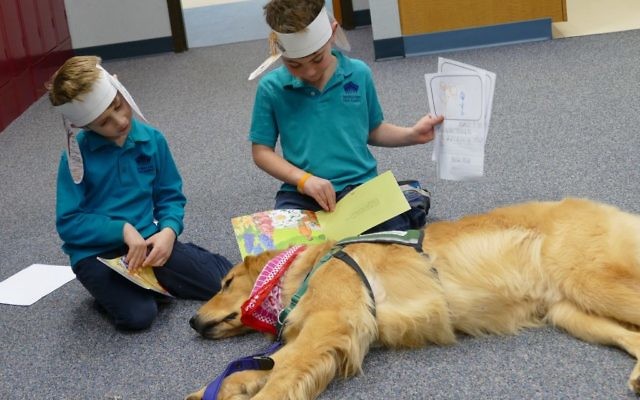
The Davis Academy continued the yearlong celebration of its 25th anniversary with a Day of Menschlichkeit on Monday, Feb. 5 (2/5).
The mitzvot during the day of service included third-graders creating greeting cards for Jewish Family & Career Services clients, fourth-graders meeting hearing from Davis parent Andy Lipman about life with cystic fibrosis, kindergartners reading to service dogs in training, first-graders and grandparents painting windows to display the characteristics of a mensch, and middle-schoolers planting a Daffodil Project garden.
“We give back because we are blessed and because we know that the value of tzedek is one of the most important lessons that we can teach our students and families,” said Rabbi Micah Lapidus, the director of Jewish and Hebrew studies. “Students at the Davis Academy are making a difference with acts of tzedek and tikkun olam every day.”
The members of the Middle School Leadership Training Institute presented five child car seats to the Sandy Springs Police Department. The money was raised during the school’s penny wars Jan. 22 to 31, and Rabbi Lapidus said the donation represented two of the school’s values: kehillah (community) and tzedek (justice).

“We expected one car seat, and y’all gave us five,” Sandy Springs police Sgt. Sam Worsham said. “Y’all blew us away.”
Feb. 5 marked the launch of another charitable drive, Soles4Souls, in which the PTO is collecting new and gently worn shoes through the Purim carnival March 2.
Four rabbis — Ron Segal of Temple Sinai, Joshua Heller of Congregation B’nai Torah, Alexandria Shuval-Weiner of Temple Beth Tikvah and Jonathan Crane of the Emory Center for Ethics — spoke to Davis’ sixth- to eighth-graders, taking all questions from Rabbi Lapidus and the students.
For example, Rabbi Heller said his favorite holiday is Yom Kippur, and Rabbi Crane said his favorite Jewish food is kugel — “noodle, of course.”
Rabbi Segal said his favorite place in Israel is the rooftop of Beit Shmuel, a hotel central to the Jerusalem campus of the Reform movement’s Hebrew Union College-Jewish Institute of Religion, which offers a view across the Old City.
Rabbi Shuval-Weiner said she would be involved in animal rights advocacy or something environmental if she weren’t a rabbi.
The four rabbis took very different paths to their profession.

First-graders get guidance from an experienced hand in painting menschlichkeit values on a window.
Rabbi Crane, the youngest of the four, said he was attracted to the job from a young age when he understood that a rabbi got paid to do things such as study Torah and teach.
Rabbi Heller said that although he is at least the eighth generation of his family to enter the rabbinate, he didn’t want to be a rabbi and studied computer science in college. But he was active in Hillel in college and realized that helping Jews was what he wanted to do.
Rabbi Shuval-Weiner said she always loved synagogue, but she grew up when there weren’t female rabbis. She said people told her, “If only you were a little boy, you could grow up to be a rabbi.”
She was ordained when she was 40.
“We knew each other before we were rabbis,” Rabbi Segal said about Rabbi Shuval-Weiner.
He said he grew up in a Jewish community in Texas that had only 35 families and was too small for a rabbi, so it wasn’t until he attended Jewish summer camp that the seed of the idea for him to be a rabbi was planted. The seed sprouted only after he tried a different career first.
Rabbi Crane urged the students to consider leadership roles when they grow up, especially in politics. “There are too few Jews running for elected office in Georgia,” said Rabbi Crane, whose wife, Lindy Miller, is an announced candidate for the state Public Service Commission this year.
Photos by Michael Jacobs except where noted
- Davis Middle School students carry donated car seats out of the gym to be transported to the Sandy Springs Police Department.
- Photo courtesy of the Davis Academy First-graders get guidance from an experienced hand in painting menschlichkeit values on a window.
- Rabbi Ron Segal answers a student’s question while Rabbis Joshua Heller, Alexandria Shuval-Weiner and Jonathan Crane listen.
- Worth, a Service Assistants dog who will turn 2 in March, couldn’t be much more relaxed while listening to stories read by kindergartners. Worth, who is training with Jane Martin, was one of at least four dogs getting experience with children and school situations at Davis on Feb. 5.
- Worth, a big golden dog, is ready to hear a story about Clifford the Big Red Dog.





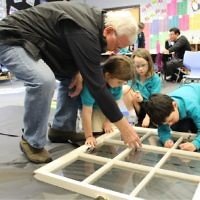
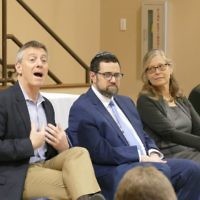
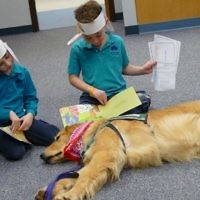
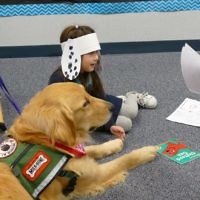
comments